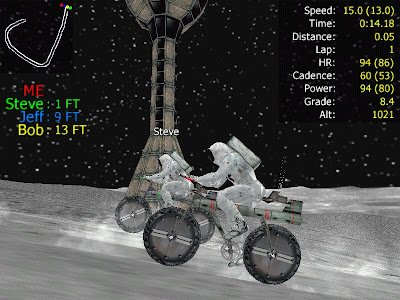To boldly go.

Practicing riding the lunar mini-bike in the zero-g "Vomit Comet" aircraft (the mini-bike concept was later abandoned) pict via: staynehoff via: the great ottonero
Via: time
"It is the future, and American astronauts have again landed on the moon. Emerging from their spacecraft, they perform such familiar chores as setting up a TV camera, placing various scientific instruments around their landing site, and collecting rocks and samples of the dusty lunar soil. Then they return to the ship to prepare for more far-ranging exploration. When the spacecraft's big hatch reopens, the astronauts scoot out, pedaling away as if they were on bicycles.
A bike on the moon? Yes, says M.I.T.
Mechanical Engineer David Gordon Wilson, who insists human-powered transportation, as he calls it, is really the only way to go on a moon mission. Adds Wilson: "Such a vehicle offers lunar explorers convenience, reliability, independence of energy supplies and beneficial physiological effects."
Wilson, co-author of the book Bicycling Science, is admittedly something of a bike nut. He pedals to class rain or shine. Even before Project Apollo was on the launchpad, he tried vainly to persuade NASA to include a pedal-powered vehicle. But the space agency opted instead for its $38 million, battery-driven lunar rover, a two-man vehicle that took up valuable payload capacity.
Unfazed by NASA's skepticism, Wilson is peddling his idea again. Writing in the magazine Galileo, he calculates that in the lunar environment, with its low gravity (only one-sixth that of earth's) and virtual lack of atmosphere, even an astronaut weighted with life-support equipment could easily achieve speeds in excess of 30 kph (19 m.p.h.) aboard an appropriately designed lunar bike.
Accordingly, Wilson is proposing a two-seat lunar vehicle or quadracycle, made of lightweight metals. It would have wheels of a metallic mesh like those on the lunar rover to cope with the moon's dusty surface. Both astronauts would pedal while sitting; with a load of scientific gear, they could easily travel several kilometers without unduly exerting themselves. Best of all, while the cost of getting to the moon may be skyhigh, moving around on it should be dust-cheap."


No comments:
Post a Comment